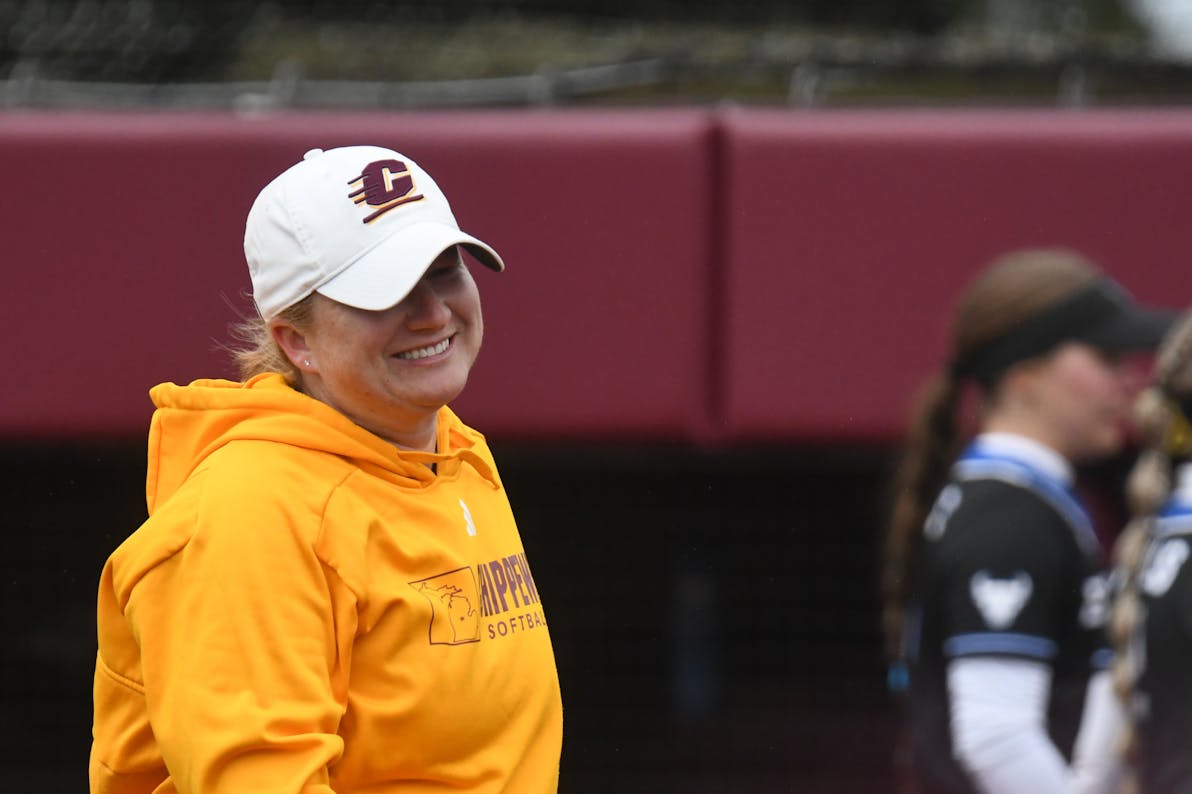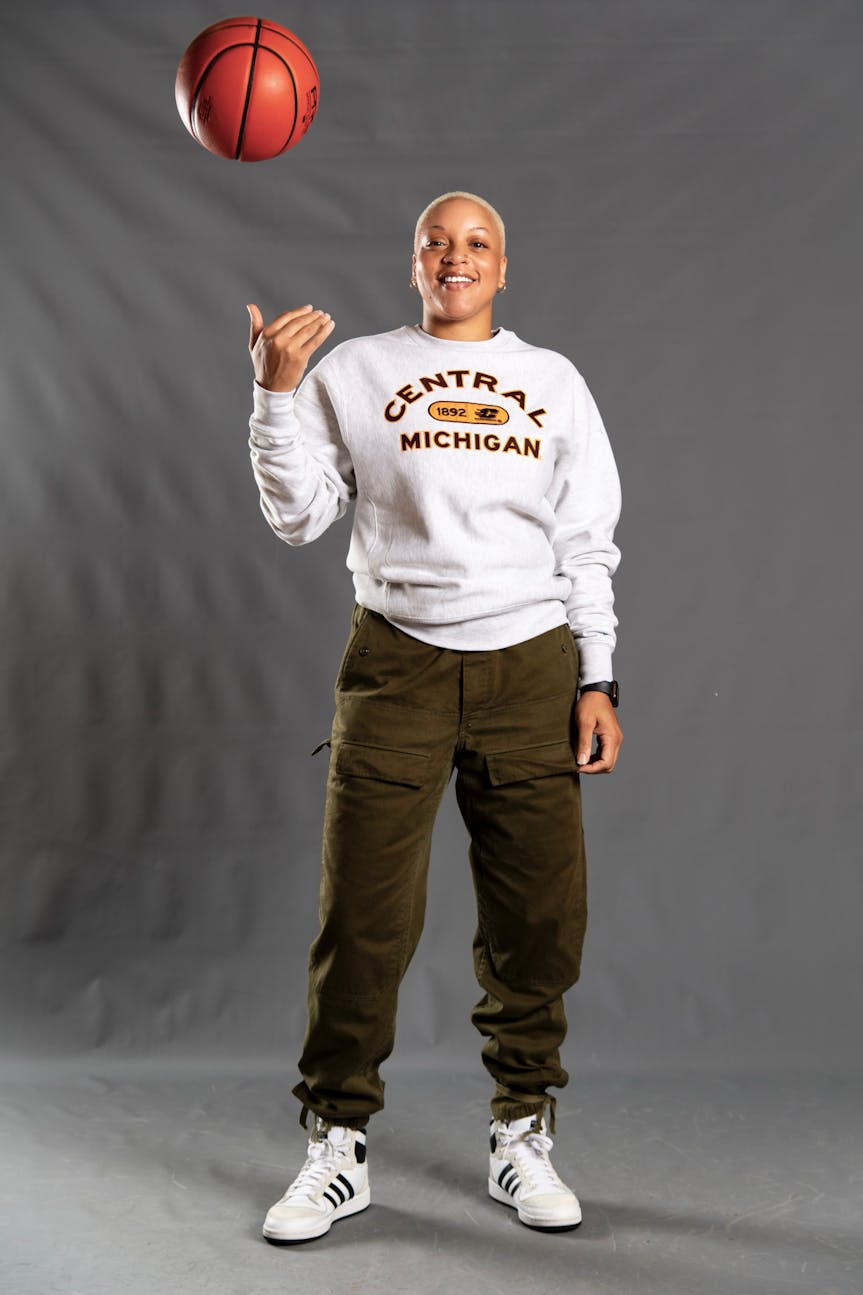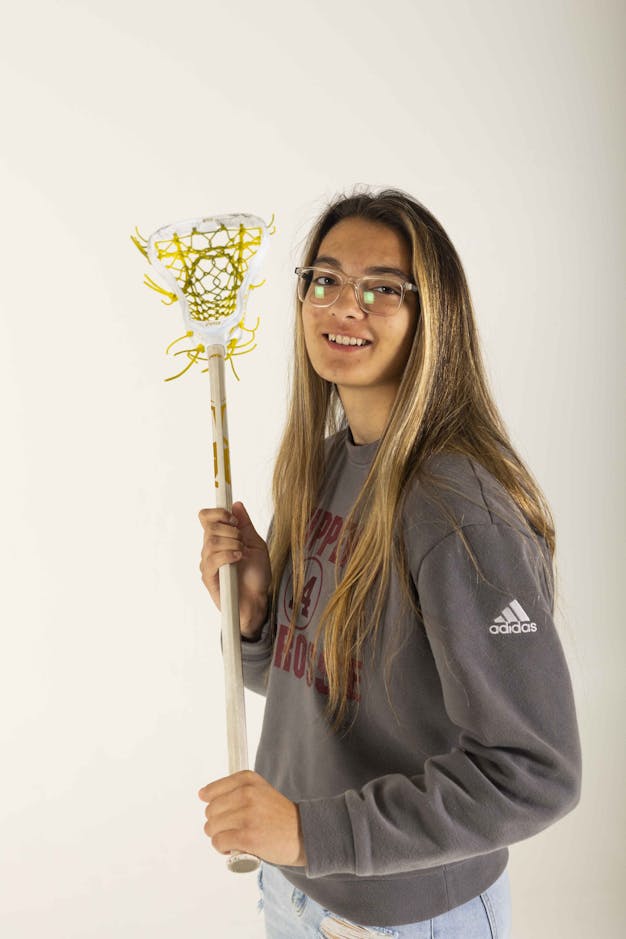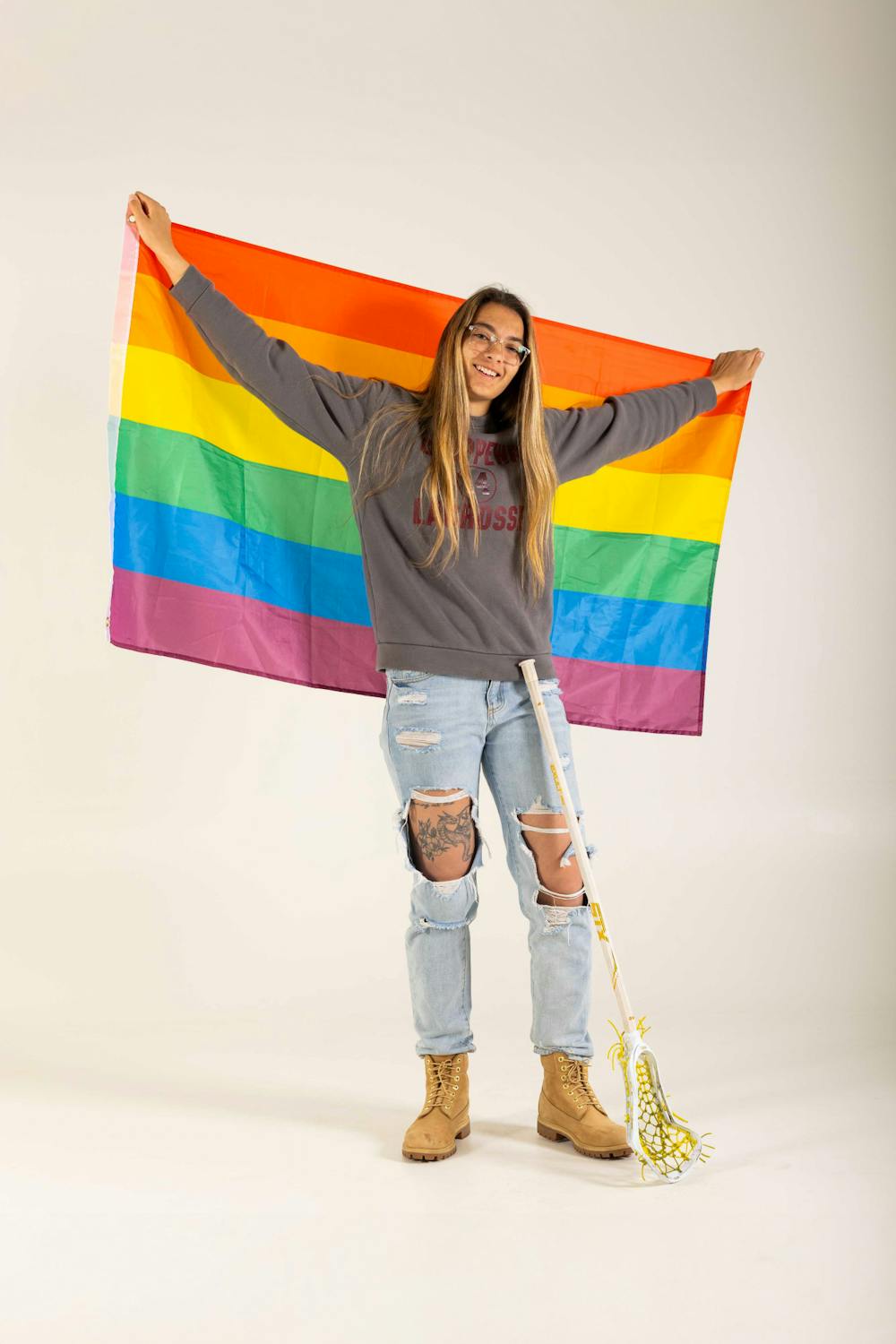‘Be unapologetically yourself’
LGBTQ athletes’ journeys to authenticity
April is pride month at Central Michigan University. Athletes, coaches and support staff across the United States and the world who are members of the LGBTQ+ community are working to make sports an inclusive environment where everyone can participate and be comfortable enough to share their identity.
Specifically at CMU, representation across sports can be seen through three women who offer their unique perspectives on finding themselves and their journeys.

Central Michigan assistant coach Brittini Merchant smiles during a game against Buffalo, Friday, April 12, in Margo Jonker Stadium.
Brittini Merchant
Brittini Merchant grew up in a sports household. Her and her three sisters all played softball at the collegiate level.
“I think my first word was ‘ball,’” Merchant said.
Merchant is now the assistant coach for Central Michigan softball, in a full-circle moment from playing for Margo Jonker as a CMU athlete in 2008.
CMU is also where Merchant grew the confidence to be her true self as part of the LGBTQ+ community.
“It was a ‘secret,’ but everybody had an idea,” Merchant said. “I just wasn’t comfortable enough to actually come out. I think my senior year I was the most comfortable with who I was.”
Merchant came out as lesbian during her fifth year at CMU, in her last semester.
“When you look back it’s like, if I would have come out what would have been different?” Merchant said. “The pressures I put on myself of I mean just competing at the highest level and doing well with that, but then also having this like secret, people might want to say.”
She said coming out made her feel more free, and she gained more confidence in all aspects of her life.
“When I’m being my authentic self, then I’m free to let other people be their authentic self and be like, ‘Oh look at her she coaches softball at Central Michigan, she’s a lesbian, she’s married to a woman and she’s just as happy as I could be,’” Merchant said.
Merchant said she did not start dating her wife until she was the assistant coach at Davenport University.
“She’s my biggest supporter and my biggest fan,” Merchant said. “After a game I go up to my wife, younger players went, ‘Oh wow, like this is normal, this can be normal. This can be accepted.’”
As a coach, Merchant has been there to help other athletes who are going through the same things that she went through when she was an athlete.
“You connect a little bit more when you’re like, ‘I went through that too,’” Merchant said. “I’ve got an open-door policy all the time, and they’re more than welcome to talk about anything.”
Merchant said surrounding yourself with a solid support system and just being yourself is important.
“I can’t stress enough to just be unapologetically yourself, be your most authentic self all the time,” Merchant said. “People will love you no matter what, and if they don’t then they don’t need to be a part of your life.”
Another person who has played a role in Merchant’s life as a supporter is, her boss, CMU softball head coach McCall Salmon.
“My wife and I got married in Mexico in November of 2022. Her husband and her two kids came so it’s been fun to see the impact that I’ve actually had on her kids because they’re like ‘it’s totally normal,’” Merchant said. “I mean there’s a lot of adults who haven’t gone to a lesbian wedding or two males getting married, so that’s been fun to watch.”
Faith played a part in Merchant coming out and finding acceptance in a religious community, as well.
“I think that was part of my struggle of coming out was because I grew up in the church,” Merchant said. “It was hard for me to be like, ‘If he knows me, why was I born this way?’ But I found a church where it’s like no, ‘you’re loved and accepted no matter what.’”
Keeping faith in her life while coming out as gay, Merchant said, was life changing.
“It was my senior spring break, and I found this website and I was like ‘yeah there are people out there that accept me,’” Merchant said. “Being a gay Christian is unique, and I fully believe that I was made the way I am, he loves me no matter what.”
Merchant said she wonders if her story might have been different if she grew up in a church that was more accepting.
“The church I grew up in, it was not ok, it was very clear that it was not okay,” Merchant said. “Once I found a church that was like ‘we welcome you and love you no matter your race, your ethnicity, your sexual orientation,’ I was like this is exactly what I needed.”

Photo Courtesy of Toccara Ross
Toccara Ross
Toccara Ross started playing basketball when she was 12 or 13. At first, she thought she would go on to play college soccer, but once she started playing basketball, she realized it was more fun.
Originally from Chicago, Ross moved in high school to Iowa where she continued her basketball career.
“I took an untraditional path,” Ross said. “I went to junior college and then I worked my butt off and got to play at the Power Five, which is the top of the top, I got to play for an elite eight which is the top eight schools in the country.”
Following her time playing basketball at Kirkwood Community College, Ross transferred to Iowa State and was a part of the Cyclone’s Elite Eight tournament run in 2009.
Ross said she didn’t really have to come out as queer, it’s just always been who she was.
“I think every queer person, we have to come out to ourselves first and what that looks like and then everything else matters,” Ross said. “That’s the game we kind of play in our head, whether or not we’re comfortable with ourselves enough to share it with the world.
“I’ve always felt comfortable in myself, but then in order to be able to articulate that to other people ... happened a little later in life.”
Ross said her professional basketball career helped her transition from a player into a coach, which played a part in her identity.
Ross played professional basketball internationally as well where she was able to find community despite being far from home.
“I played pro for 15 years, so in that space you see a lot of people who one, look like you, two who are a part of the community so it’s a little bit easier for you to navigate,” Ross said. “You have a different set of freedoms as a professional athlete, you have a privileged life as a professional athlete, so it’s a little bit different.”
Ross said her vulnerability is a factor in identity. For those trying to find their identity, she said it’s important to check in and decide what needs to be prioritized to feel comfortable in their body and space.
“I had already knew who I was stepping into my coaching career,“ Ross said. “So that I didn’t have to articulate that to anybody, so being able to stand in my truth. I don’t know if it helps me coach better, but I would hope that my players, a lot of my players who do identify, is that they are able to be themselves around me.”
Ross’s international career includes a Swiss League Championship and being named the player of the year in Puerto Rico’s top professional league Baloncesto Superior National Femenino.
“I think Europe and the world outside of the Western culture has always been more open to queerness outside of the Americas that history tells us that so I think that process of showing up as a queer person was a bit easier,” Ross said.
“I feel like you can always find your people if you look for them.” “I fortunately did not have an issue finding people who look like me and who are part of the LGBT community, but I also sought them out.”
Ross being comfortable in her identity has allowed her to help the athletes she coaches who are a part of the community.
“I think our staff is very unique in the coaching world because we do have multiple people that identify as queer,” Ross said. “Our head coach (Kristin Haynie) is openly queer, has a wife, so that really helps, I hope that just being in my body and being confident in my body that they see who I am they see that I am also vulnerable, that leads to them being vulnerable.”
Along with having an open door to talk about identity with her athletes, Ross is also an ambassador for Athlete Ally, an organization that creates groups to help students feel safe specifically in college.
Athlete Ally has helped to pioneer reform for LGBTQ athletes around the world. The organization has worked at the collegiate level to co-author the NCAA’s first policy and resource guide on LGBTQ issues for coaches, athletes and administration.
“There’s a lot of knowledge and there’s a lot of policy involved into being heard and that platform not only, amplifies the voice of student athletes and pro athletes to be able to implement change,” Ross said. “So as a pro ambassador, as a former pro player I get to sign on to legislation.”
Ross said one of the ways college athletics could improve is by creating more inclusive spaces, particularly at CMU.
“I had at a couple other of my universities we had not only Athlete Ally, but we had queer spaces for student athletes,” Ross said. “I personally don’t know if there’s anything like that available on campus or what queer spaces are available on campus, more specifically for minority students as well,” Ross said.
Students who may be struggling to find community, Ross said, should start building that community themselves.
“Build a table, build space, what you don’t see you have to create, you can’t wait for someone else to do that,” Ross said. “I know a lot of the discussions that I have with young people who are part of the community is, ‘Oh well, I don’t see this and I don’t see that’ build it, create it.”
Ross said LGBTQ and BIPOC students and student athletes cannot rely on people not a part of their communities to make the first move when it comes to change.
“You can’t wait for cis people to do that, you can’t wait for non-POCs to do that,” Ross said. ”You have to just do it on your own and you have to create the space because I can almost guarantee that there’s someone else out there feeling the same vulnerability and having the same need.”
Ross said people who are not a part of the LGBTQ or minority communities have to listen to those communities.
“Listen to Black and brown folks, listen to women and nonbinary folks, because again they are still the most marginalized within that group,” Ross said. “Listen to them and allow them to help you co-create what those organizations look like. A lot of the LGBTQ community and organizations are underfunded because the allies do not understand the necessity of resource.”
Ross said the LGBTQ community needs allies to help navigate spaces because they take up larger spaces themselves.
“So if someone is reading this, I really want them to tap into their vulnerability and create those shared spaces because I know they are necessary in order for us to shift change and be on the right side of history as a lot of these legislations and platforms are changing,” Ross said.

Alyssa Lowe
Alyssa Lowe has played lacrosse for 12 years. Her brother played lacrosse and that led her to also become interested in the sport.
Her brother was also supportive in her journey coming out as lesbian to her family.
“Actually coming out to them was scary, but they’ve been very accepting afterwards,” Lowe said. “My brother knew before my parents, so he helped me come out to them, so that was nice.”
She is now in her freshman season at CMU.
”Just try to be comfortable being yourself,” Lowe said. “Most people are supportive of it, and if they’re not then they don’t deserve to be in your life.”
Lowe is from Plainfield, Illinois, which she said is a pretty liberal town where she felt comfortable being who she is.
“All of my teammates have been very accepting,” she said. “Sports is usually a heteronormative environment, but all my teammates are supportive and I haven’t been treated differently because of it.”
Lowe came out her freshman year of high school.
“When I was a senior, I was a captain on my team, and I had a freshman, she kind of just saw me talking about like my love life and girls and stuff, and that kind of inspired her to come out,” she said. “I just want younger athletes to be comfortable being themselves and embrace not hiding their identity while they’re playing sports.”
Lowe said the staff and athletes are all open, supportive and inclusive, but she would like to see more programs within athletics for LGBTQ athletes.
“Just to get like awareness out there would be nice maybe like a kind of support system for athletes who are struggling with coming out,” she said.
Central Michigan athletics has a council for diversity, equity and inclusion that collaborates with the office of LGBTQ+ services.
”I know especially with sports sometimes people feel forced to hide who they are and just fit in with the team,” Lowe said.
Lowe said she thinks it’s important for athletes to be able to feel comfortable being themselves.
“I definitely feel more comfortable like not hiding being who I am and being able to talk to my teammates about my relationship, or whatever,” She said. “It does feel more me and I love playing my sport, I feel like it would put a damper on that if I wasn’t being myself.”







